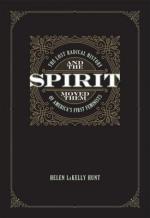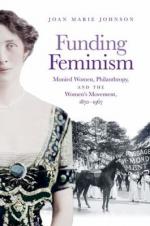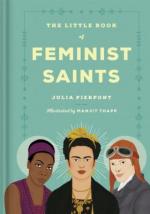March 18, 2018 | sobczakd
Philanthropist and therapist Hunt (Faith and Feminism) addresses elements of early feminism, primarily its interracial and religious aspects, which she asserts were "lost in the [20th] century." "The origin of modern feminism is its Christian bedrock" is a central theme in the book, as Hunt revisits all-women antislavery conventions held in America in the late 1830s. Notable-but not necessarily forgotten-figures appear (generally referred to by their first names), among them Lydia Maria Child, Sarah and Angelina Grimke, and Lucretia Mott, and the lesser-known Mary Grew and Abby Kelly. Hunt is attentive to the involvement of black women, particularly Grace and Sarah Douglass and Sarah Forten. The book is framed by accounts of Hunt's personal history and involvement with women's organizations. Unfortunately, factual inaccuracies (e.g., she names Frederick Douglass as one of the founders of the American Anti-Slavery Society in 1833) and unsubstantiated claims (she writes that a group of organizers "took to heart the words written decades earlier by Phillis Wheatley" but does not provide evidence of them having ever read Wheatley's work) plague this lighthearted treatment of a well-known segment in the history of the women's movement.
Historian Johnson's (Northwestern Univ.) first book examines the role that wealthy white women have played in advancing women's rights through financial support for feminist causes. Across seven thematic, roughly chronological chapters, the author examines a century of female philanthropy in the areas of suffrage, labor, education, and birth control, persuasively arguing that donors with deep pockets persistently shaped the priorities and successes of organized feminism. Women such as Alva Belmont, Katherine McCormick, Mary Garrett, and Grace Dodge funded office space and paid positions in the suffrage movement, established working women's clubs, built living quarters for female students, and funded decades of research that brought us the birth control pill. Throughout, Johnson highlights the uneasy reality that such contributions-often crucial to movement successes-gave these women disproportionate influence among activists who were fighting for greater equality. Thus, feminist philanthropists often became controversial figures within the movement they helped to support. VERDICT This compelling work of original and much-needed research with be of interest not only to those who study the history of feminist activism but to those with an interest in the power that private money wields in social justice circles.
Novelist Pierpont (Among Ten Thousand Things) and illustrator Thapp collaborate to create a patchwork of biographical sketches on groundbreaking women, from well-known figures such as former first lady Michelle Obama and the Brontë sisters to lesser-known women such as WWII lieutenant Grace Hopper. The format plays off the Catholic saint-of-the-day book, meant to be read in intervals as a source of daily inspiration. Each entry aims to delineate one of the fascinating experiences and contributions of a women Pierpont and Thapp deem worthy of secular feminist sainthood. Pierpont plays around with style of the entries with varying degrees of success. The entry on Barbara Jordan, for example, is written entirely in the second-person, which is distracting and provides no real grounding of Jordan's accomplishments; the same is true for the entry on Ann and Cecile Richards, which is composed of quotes from the women themselves. There are moments when Pierpont strikes the perfect balance between style and content; the profiles of Helen Keller and Bea Arthur, for example, combine the right amount of introductory information with a written flair that renders these women as worthy idols. Thapp's colorful painted portraits of each subject enhance the book's appeal.
Cooper, Cosmopolitan contributor and cofounder of the Crunk Feminist Collective blog, provides incisive commentary in this collection of essays about the issues facing black feminists in what she sees as an increasingly retrograde society. Many of the essays are deeply personal, with Cooper using her own experiences as springboards to larger concerns. In the essay "The Smartest Man I Never Knew," Cooper uses the story of the attempted murder of Cooper's mother (while she was pregnant with Cooper) by her mother's jealous boyfriend as an example of American culture's toxic masculinity. Elsewhere in the collection, the author explores her own identity as a black, Southern, Christian feminist and the ways in which personal politics can become incongruous, and she openly admits her own privilege. Cooper is at her best and most inflammatory in an essay titled "White Girl Tears," in which she bulldozes white feminists for cultural appropriation and failing to "come get their people" during the 2016 presidential election. Cooper also cleverly uses Michelle Obama's hair to craft an artful censure of respectability politics and discusses Beyoncé as a cultural symbol of black female solidarity. In these provocative essays, Cooper is both candid and vulnerable, and unwilling to suffer fools.
In this sassy craft book, pop-culture expert, crafter, writer, and feminist Burton offers more than two dozen DIY projects inspired by real and fictional feminists. Crafting has sometimes been associated with an unenlightened view of equality, but Burton stresses that by making things, readers can express frustration and take a constructive approach to effecting change. The intent is for people to gather together to have fun, make unique creations from easily sourced materials, and share the things they've made with others. Projects include feminist merit badges, heroes of feminism finger puppets, cute dolls made from tampons, a huggable uterus body pillow, tree ornaments shaped like vaginas, and more. There are projects for all skill levels, and the reader is invited to customize each one to make it truly personal. Motivational quotes, feminist-themed lists, and media recommendations are interspersed throughout. Perfection á la Martha Stewart is not the goal here. Approaching loaded issues with a light heart and a sense of humor is the aim.
This collection of essays edited by Mukhopadhyay (senior editorial director of culture & identities, Mic) and Harding (Asking for It) aims to present a diverse group of voices "writing at the intersection of feminism, identity, and personal experience" with a primary focus on the 2016 presidential election. Many pieces focus on the authors' personal reaction to the election results, with some describing their anger, fear, and heartbreak. The contributors, including Cheryl Strayed, Rebecca Solnit, Alicia Garza, and others represent a variety of groups who fear being marginalized under Donald Trump owing to discrimination based on their race, ethnic background, religion, sexual orientation, or gender nonconformity. Some essays analyze the reasons behind Hillary Clinton's loss of the presidency and the sexism that permeated the election, presenting historical context on the struggle for gender equality. There are also chapters on current women's issues: health care, reproductive rights, -immigration, and economic inequality. Taken together, these writings emphasize the need for an intersectional feminist movement. The final essays present a general path forward and the importance of building an inclusive coalition focused on active resistance. Unfortunately, these chapters lack details on specific actions, but they broadly encourage personal and public forms of resistance. VERDICT A thought-provoking view of the election from an array of feminist perspectives that will be of interest to many.
Like her previous books Girls & Sex and Cinderella Ate My Daughter, Orenstein's latest looks at the damage that gender stereotyping has on lives and laws, among other things. This book would complement women's, gender, and sexuality studies because of the range of the essays, especially in the first section, in which Orenstein profiles women such as graphic novelist Phoebe Gloeckner, iCarly star Miranda Cosgrove, and scientist Elizabeth Blackburn. That being said, the real strength of this collection is Orenstein's beautiful interweaving of personal stories with politics and her writings on/about politics. In some ways, her description of Gloeckner's deployment of genre conventions (mixing a traditionally female form, the diary, with male-dominated comic book writing) could describe her own approach, which blurs the boundaries among polemical, personal, and political. Orenstein situates her writing within her own identity, thereby suggesting the limitations of her viewpoints. Overall, she enriches her readers' understanding of abortion laws, breast cancer, body image, pornography, and other timely issues in specific yet open-ended and complex ways.






